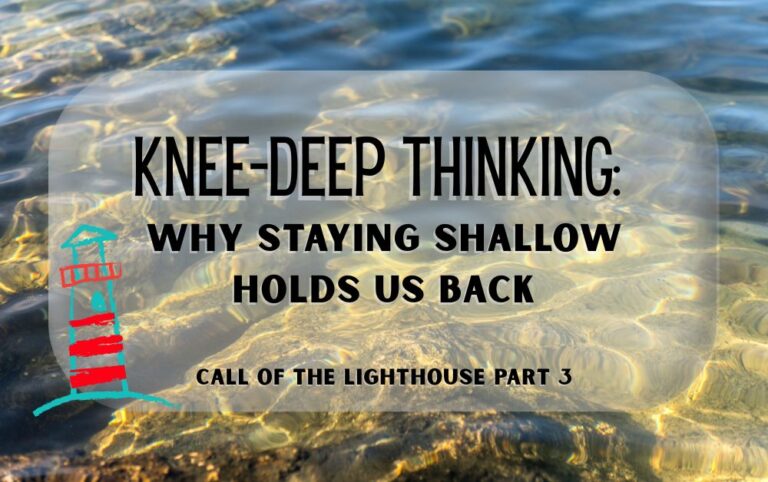
Knee-Deep Thinking: Why Staying Shallow Holds Us Back
Safe feels easy, but the real growth happens when we wade deeper.
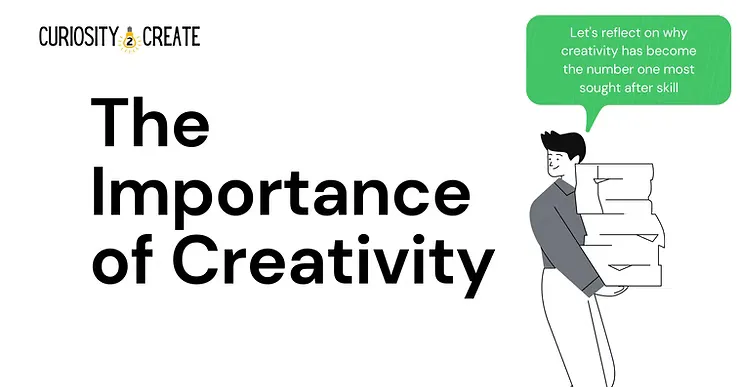
Are you creative enough for the future?
Think about what life was like in the 1970s and 1980s. Remember using a payphone when you had to have a roll of dimes in case you ran out of talking time? What about an actual map where you had to figure out what direction you were going and what street you were on? Or when you were your parents’ remote control and had to change the channel for them – but then again, there were only three or four TV channels to pick from? How about that time you had to write a research paper and use the card catalog in the library – there wasn’t Siri or Google to help us search for information.
Maybe that’s too far back…how about the 2000s? We had Myspace instead of Facebook, iPods instead of iTunes, and Gameboys instead of the Switch.
Now, think about 2041 or 2061. What will technology look like? Will we be able to transport ourselves somewhere like in Star Trek?
Needless to say, technology has come a long way, and we have curious, creative innovators to thank.
We talk a lot about creativity and curiosity around here. We think it is pretty essential, but we aren’t the only ones.
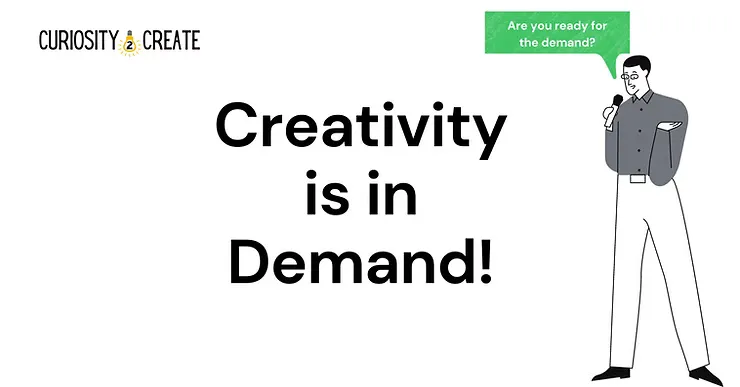
In the last couple of years, creative skills ranked high in both LinkedIn and World Economic Forum reports – just to name a few.
This is what we know – Innovation happens when people are curious and creative.
That’s precisely why recent studies have ranked creativity as one of the top skills needed in the future. One of the biggest questions young people ask is “What should I be when I grow up?”
That question isn’t easy to answer. In fact, many jobs of the future have yet to be created. According to the Center for the Future of Work, numerous new jobs will emerge within the next decade and “become cornerstones of the future of work.”
This fascinating report also states that “our greatest quality is our curiosity.” This is why it is vital to instill creativity and curiosity into our children and instill the need to be life-long learners!
Let’s break down what LinkedIn and World Economic Forum reports are saying about creativity.
In 2019 LinkedIn “used exclusive LinkedIn data to determine the skills companies need most in 2019. These are the skills your boss and your boss’s boss find most valuable but have a hard time finding – and the skills that’ll most help you better serve your clients and customers.” As a result, Linked in ranked creativity as the #1 skill in 2019 and 2020.
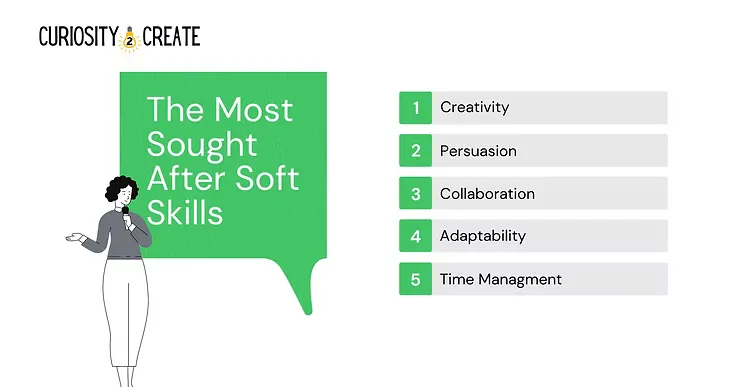
According to data analysis by Linked In, in 2019, companies were looking most for these soft skills:
LinkedIn author Paul Petrone points out the importance of soft skills stating, “Strengthening a soft skill is one of the best investments you can make in your career, as they never go out of style. Plus, the rise of AI is only making soft skills increasingly important, as they are precisely the type of skills robots can’t automate.” What exactly are soft skills versus hard skills?
Soft skills are the traits that make you good at any job such as communication and management skills. Hard skills are more teachable and measurable. In another LinkedIn report, 57% of senior leaders today value soft over hard skills.
Companies today are most interested in finding people who can think of new, better solutions, and that requires creativity. You may not think that creativity is a teachable skill, but, like any skill, you can get better at it – with practice.
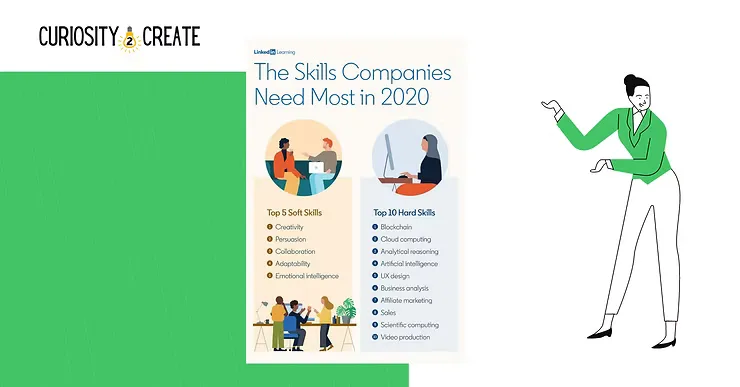
LinkedIn isn’t the only company investigating the importance of creativity. The World Economic Forum is also tracking the movement in creativity, and since 2016, this skill has stayed near the top.
In 2016, the WEF projected that Creativity would reach the #3 spot on the list of Top 10 Skills, moving up from #10 in their previous rankings (see graphic below). The 2018 report predicted that in 2022, we will continue to see creativity grow in importance.
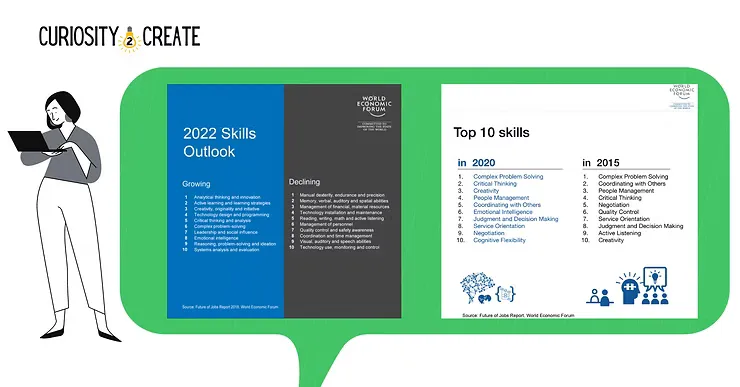
Till Alexander Leopold and Vesselina Ratcheva, Project Leads in the World Economic Forum’s Centre for the New Economy and Society, wrote “Human” skills such as creativity, originality and initiative, critical thinking, persuasion, and negotiation will likewise retain or increase their value, as will attention to detail, resilience, flexibility, and complex problem-solving.”
As reported on LinkedIn, the rise in technology and AI are major reasons for the changes.
Alex Gray of the WEF wrote, “ With the avalanche of new products, new technologies, and new ways of working, workers are going to have to become more creative in order to benefit from these changes. Robots may help us get to where we want to be faster, but they can’t be as creative as humans (yet).”
To keep pace with the changes in our work environment, WEF predicts that by 2022, everyone will need an extra 101 days of training and skill development.
In other words, remember how your teachers always said that it’s important to be lifelong learners, and we would roll our eyes, thinking, “I can’t wait to get out of school!?”. Well, guess what – those teachers were right.
That’s why at Curiosity 2 Create, we feel it is vital to teach the next generation that it’s OK not to know what they want to do when they grow up—because, honestly, we don’t know what jobs will be available. What we are confident in are our creativity and curiosity. If we can help our kids grow and thrive in these two skills, we will prepare them for anything.
We may not be able to jump into our DeLorean time machine and travel back in time, but we can plan for it.
I’m Katie Trowbridge, and I am the author of this post. I am also the president and CEO of Curiosity 2 Create, which is a nonprofit organization that offers professional development and coaching for educators and administrators.
We use what we call the CREATE Method, which is an ESSA Level 4 Backed method that reduces chronic absenteeism, improves student engagement, and increases student academic performance using our CREATE Method model. Schedule a call here to learn more about how Curioisty 2 Create and the CREATE Method can help you and your school today.
Share Post:

Safe feels easy, but the real growth happens when we wade deeper.
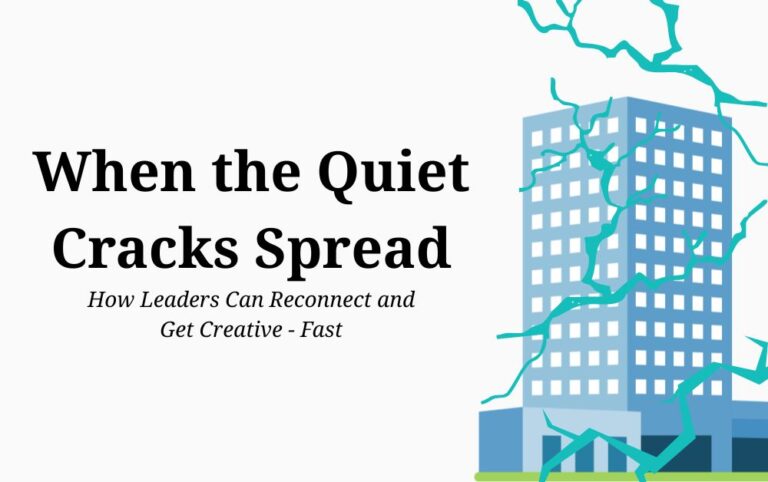
I can still picture it—walking through my northwest Chicago neighborhood with friends,

A lighthouse doesn’t shine just for decoration; it exists because lives depend